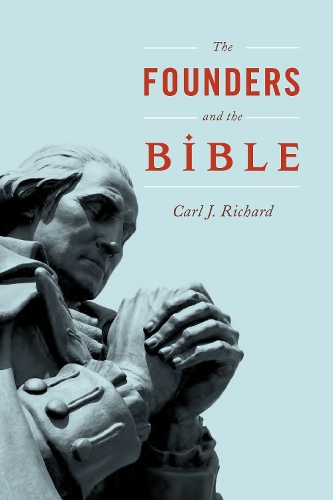
The Founders and the Bible
(Paperback)
Available Formats
Publishing Details
The Founders and the Bible
By (Author) Carl J. Richard
Bloomsbury Publishing PLC
Rowman & Littlefield Publishers
23rd October 2017
United States
Classifications
General
Non Fiction
Politics and government
Christianity
Religious institutions and organizations
973.3
Physical Properties
Paperback
396
Width 147mm, Height 231mm, Spine 29mm
581g
Description
The religious beliefs of Americas founding fathers have been a popular and contentious subject for recent generations of American readers. In The Founders and the Bible, historian Carl J. Richard carefully examines the framers relationship with the Bible to assess the conflicting claims of those who argue that they were Christians founding a Christian nation against those who see them as Deists or modern secularists. Richard argues that it is impossible to understand the Founders without understanding the Biblically infused society that produced them. They were steeped in a biblical culture that pervaded their schools, homes, churches, and society. To show the fundamental role of religious beliefs during the Founding and early years of the republic, Richard carefully reconstructs the beliefs of 30 Founders; their lifelong engagements with Scripture; their biblically-infused political rhetoric; their powerful beliefs in a divine Providence that protected them and guided the young nation; their beliefs in the superiority of Christian ethics and in the necessity of religion to republican government; their beliefs in spiritual equality, free will, and the afterlife; their religious differences; the influence of their biblical conception of human nature on their formulation of state and federal constitutions; and their use of biblical precedent to advance religious freedom.
Reviews
This is a thoroughly documented study that shows the many ways the founders of the American republic were immersed in the language, images, teachings, and general ethos of the Bible. * Interpretation: A Journal of Bible and Theology *
One long-running sideshow of the culture wars is a squabble about the Christian orthodoxy of the Founding Fathers: believers or heretics Illuminating the question so greatly as to dispel it, Richard relays what and how Washington, Adams (John and Samuel), Paine, Jefferson, Madison, Monroe, Franklin, Jay, Hamilton, Henry, and others wrote about religion and Christianity in relation to such concepts as divine intervention, morality, republicanism, American exceptionalism, free will, biblical authority, life after death, human nature, sin, and church-state relations. He provides quotation-filled chapters on those matters, demonstrating how thoroughly the Bible suffused colonial and early republican American culture and how particular founders, especially the least orthodoxly Christian, studied the Bible throughout their lives; none of them was atheist nor even deistnot even Paine. Even when religion wasnt the subject, when they wished to speak with maximal weight, they adopted the language of the King James Bible. . . . [I]t is an invaluable resource, especially given its good, not overly complicated index. * Booklist *
Questions about the American founding generations faith often intertwine with contemporary politics; those on the right overstate the founders Evangelicalism, and those on the left overstate their secularism. Having read public and private writings of 30 leaders in the founding generation, Richard weighs in on these debates, suggesting that scholars have underestimated the Bibles role in shaping intellectual and political life in revolutionary America. He argues that the Bible definitively framed the founders worldviews. Richard is at his best when he shows how pervasive the Bible was in popular culture. . . . .Richard demonstrates beyond a doubt that the founders peppered their political rhetoric with biblical language. . . .
Summing Up:Recommended. General collections and up.
The Founders and the Bible is an important addition to the existing literature on American history. Carl J. Richard conclusively establishes that American founders were neither theocratic Christians who wanted to establish a Christian Sparta, nor were they outright secularists in the 21st century sense. It is a very scholarly and well-researched book. It is written in such a way that even a layperson will enjoy reading it. * The Washington Book Review *
Politically inflected debates over Christianitys influence over the American Founding will always be with us. But for those who seek to understand the past rather than exploit it for present-day purposes, Carl Richards lucid and judicious book will prove an indispensable resource. No one can come away from a reading of it without understanding that the Founders lived in a world saturated with the images, narratives, cosmology, anthropology, morality, and providential promises of the Bible, and that the views of even the most unorthodox among them had very little in common with the late-modern secular outlook. -- Wilfred M. McClay, University of Oklahoma
Benjamin Rushs insight, men are governed only by the Bible or the bayonet, encapsulates the worldview of Americas Founders. In The Founders and the Bible Carl Richard, Americas premier intellectual historian, shows the Bible molding the intellectual, political and religious life of the early republic. Even Franklin, Jefferson and Tom Paine believed in a providential deity who created and sustains the world. Richards book is the first step in a much needed re-writing of American history. -- E. Christian Kopff, University of Colorado, Boulder
In this single volume, Professor Richard provides a thorough, if not exhaustive, presentation of the evidence showing the enormous influence of the Bible on the leading members of the Founding generation. The book will prove a valuable resource for all who study the American political enterprise. -- David Upham, University of Dallas
Author Bio
Carl J. Richard is the author of Greeks and Romans Bearing Gifts: How the Ancients Inspired the Founding Fathers (2008) and Why Were All Romans: The Roman Contribution to the Western World (2010). He is professor of history at the University of Louisiana, Lafayette.
